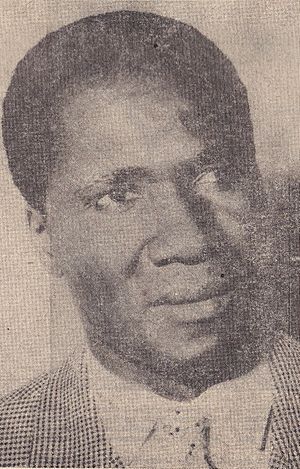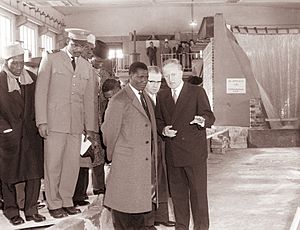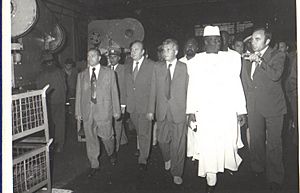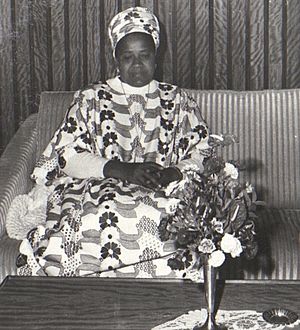Ahmed Sékou Touré facts for kids
Quick facts for kids
Ahmed Sékou Touré
|
|
|---|---|
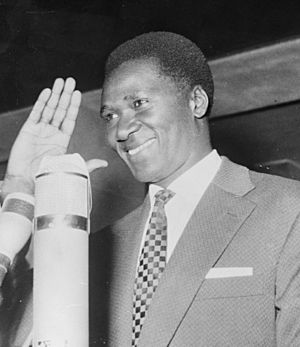
Touré in 1962
|
|
| 1st President of Guinea | |
| In office October 2, 1958 – March 26, 1984 |
|
| Prime Minister | Louis Lansana Beavogui |
| Preceded by | Position established |
| Succeeded by | Louis Lansana Beavogui |
| Personal details | |
| Born | January 9, 1922 Faranah, French Guinea |
| Died | March 26, 1984 (aged 62) Cleveland, Ohio, U.S. |
| Political party | Democratic Party |
| Spouses | Marie N'Daw (1947–1952) Andrée Touré (1953–1984) |
| Children | Aminata Touré, Mohamed Touré |
| Parents |
|
| Military service | |
| Allegiance | |
Ahmed Sékou Touré (born January 9, 1922 – died March 26, 1984) was a very important political leader from Guinea, a country in West Africa. He became the first president of Guinea in 1958 and served until he passed away in 1984. Touré played a key role in helping Guinea gain its independence from France.
He was a Muslim and came from the Mandinka ethnic group. His great-grandfather was Samori Ture, a powerful leader who created an independent Islamic state in West Africa. After Guinea became independent, Sékou Touré's political party, the Democratic Party of Guinea (PDG), became the only legal party in 1960. He was re-elected several times without anyone running against him. During his time as president, many people who disagreed with him were put in prison or faced harsh treatment.
Contents
Becoming a Leader
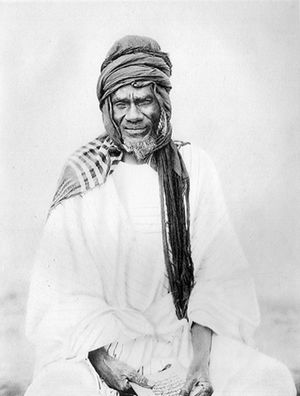
Sékou Touré was born on January 9, 1922, in Faranah, which was then called French Guinea. It was a colony of France. Faranah is a town located on the banks of the Niger River. He was one of seven children in his family, who were farmers. He belonged to the Mandinka ethnic group, which had a history of important leaders. His great-grandfather, Samori Ture, was a famous Mandinka king. Samori Ture created the Wassoulou Empire and fought against French colonial rule until he was captured in 1898.
Sékou Touré went to a Qur'anic school and then a French primary school. In 1936, when he was 15, he joined a technical college. However, he was expelled less than a year later for leading a student protest about the food. After this, he quickly became involved in labor union activities. He also studied the ideas of thinkers like Karl Marx and Vladimir Lenin.
In 1940, Touré got a job with a French company. He later worked for the postal service in Conakry, the capital city, starting in 1941. During this time, he made connections with a large French labor organization.
Getting Involved in Politics
Touré became active in politics while working for the postal service. In 1945, he started the first trade union for postal and telecommunications workers in French Guinea. He became the leader of this union in 1946. In the same year, he helped create the African Democratic Rally (RDA). This was a group of political parties from different French colonies in West and Equatorial Africa.
By 1948, he was a top leader in a major labor union group. Two years later, he became the general secretary for the same group across French West Africa.
In 1952, he became the leader of the Democratic Party of Guinea (PDG), which was the Guinean part of the RDA. The RDA worked to end colonial rule in Africa. Touré's biggest success as a union leader was in 1953. Workers across French Guinea went on a 71-day strike to demand better labor laws. This strike was longer than any other in French West Africa. Because of his success, he was elected to Guinea's local assembly that same year.
In 1957, he helped organize a major trade union center for all of French West Africa. He worked closely with Félix Houphouët-Boigny, who later became president of Ivory Coast. In 1956, Touré was elected to the French National Assembly (like a parliament) and also became the mayor of Conakry. He used these positions to speak out against French colonial rule.
Touré also represented African groups in France. He worked to negotiate for the independence of France's African colonies.
In September 1958, France held a vote on a new constitution. French colonies could choose to stay as they were, become part of France, or become an independent republic within a new French Community. However, if they rejected the new constitution, they would become independent right away. French President Charles de Gaulle made it clear that countries choosing full independence would lose all French financial aid and support.
Touré's party, the PDG, urged Guineans to vote "No" to the new constitution. When General de Gaulle heard this, he said, "Then all you have to do is vote 'no'. I pledge myself that nobody will stand in the way of your independence." The French also warned that they would cut off all aid if Guinea became independent. Guinea's people overwhelmingly voted "No." So, on October 2, 1958, Guinea became an independent state with Touré as its president. Guinea was the only French colony to choose immediate independence.
In response to Guinea's vote, many French people living in Guinea left the country. They even destroyed some of Guinea's infrastructure as they departed. For example, The Washington Post reported that the French "unscrewed light bulbs, removed plans for sewage pipelines in Conakry, the capital, and even burned medicines rather than leave them for the Guineans." This was seen as a warning to other French colonies.
President of Guinea
In 1960, Touré declared that the PDG was the only legal political party in Guinea. For the next 24 years, he held most of the power in the country. He was elected president for a seven-year term in 1961, and since he was the only candidate, he won easily. He was re-elected without opposition in 1968, 1974, and 1982.
During his presidency, Touré's policies were based on socialism. This meant that foreign companies were taken over by the government, and the economy was planned by the state. He even won the Lenin Peace Prize in 1961. He famously said, "Guinea prefers poverty in freedom to riches in slavery." This meant he valued independence more than wealth that came with being controlled by others.
However, his government also faced criticism. Human rights groups like Amnesty International said that his rule was very strict. Many people who disagreed with him were imprisoned. From 1965 to 1975, Touré ended all of Guinea's relations with France, the country that used to rule it.
Touré believed that Africa had suffered a lot under colonization. He thought African nations should cut ties with their former colonial rulers. However, in 1978, Guinea's relationship with the Soviet Union became less friendly. As a result, the President of France, Valéry Giscard d'Estaing, visited Guinea. This was the first visit by a French president since Guinea's independence.
Even though Touré had disagreements with France, he kept good relations with several socialist countries. However, his strong stance against France was not always popular with his own people or other African countries. About 1.5 million Guineans left the country to live in neighboring nations like Sierra Leone. Despite this, many anti-colonial and Pan-African groups supported Touré.
Touré's main allies in the region were presidents Kwame Nkrumah of Ghana and Modibo Keïta of Mali. After Nkrumah was removed from power in 1966, Touré offered him a safe place to stay in Guinea and even called him a co-president. As a leader of the Pan-African movement, Touré often spoke out against colonial powers. He also became friends with African American civil rights activists like Malcolm X and Stokely Carmichael. He offered Carmichael a safe place in Guinea.
With Nkrumah, Touré helped create the All-African Peoples Revolutionary Party. He also supported the PAIGC fighters in their struggle against Portuguese colonialism in neighboring Portuguese Guinea. In 1970, the Portuguese launched an attack on Conakry to rescue their prisoners and try to overthrow Touré's government. They rescued the prisoners but failed to remove Touré from power.
His relations with the United States became difficult after President Kennedy's death. Touré believed that the Central Intelligence Agency (CIA) and the Soviet Union were plotting against his government, even though he accepted economic aid from both.
During its first 30 years of independence, Guinea became a socialist state. The ruling party, the PDG, had almost complete control over the country's economy and politics. In 1966, Guinea asked the US Peace Corps to leave because they were suspected of being involved in a plot against President Touré. Similar accusations were made against France, and diplomatic relations were cut in 1965, only to be restored in 1975.
In 1970, international tensions rose again when about 350 men, including Portuguese soldiers, entered Guinea to rescue Portuguese prisoners and capture Touré. After this, Touré ordered many arrests and detentions of people suspected of being against his government.
Between 1969 and 1976, Amnesty International reported that 4,000 people were held for political reasons in Guinea. In 1976, after a supposed plot to kill Touré was revealed, Diallo Telli, a government minister, was arrested and died in prison without a trial.
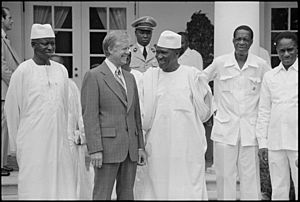
In 1977, protests against the government's economic rules led to riots where three regional governors were killed. Touré responded by making trade rules less strict, offering forgiveness to people who had left the country (thousands returned), and releasing many political prisoners. Relations with the Soviet Union became cooler as Touré tried to get more aid and investments from Western countries for Guinea's struggling economy.
He put his strongest opponents in prison or forced them to leave the country. Over time, Touré arrested many suspected political opponents and held them in prisons.
Domestically, Sékou Touré followed socialist economic policies. This included the government taking control of banks, energy, and transportation. In foreign affairs, he joined the Non-Aligned Movement, which meant he didn't side with either the US or the Soviet Union. He also developed very close ties with Mao Zedong and China.
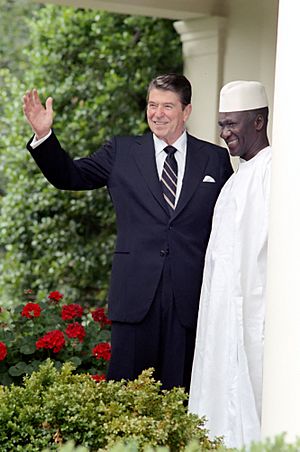
When Guinea started to improve its relations with France in the late 1970s, some of Touré's supporters who believed in Marxism began to disagree with his shift towards capitalism. In 1978, Touré officially moved away from Marxism and restarted trade with Western countries.
In 1980, elections were held for the National Assembly. Touré was re-elected for his fourth seven-year term as president on May 9, 1982, again without anyone running against him. A new constitution was adopted that month, and Touré visited the United States during the summer. In Washington, he asked for more American private investment in Guinea. He said that Guinea had "fabulous economic potential" because of its large mineral reserves. This was seen by US diplomats as an admission that his socialist economic policies had not worked well. At that time, the average income for Guineans was very low, life expectancy was short, and few people could read. In 1983, he announced more economic changes, allowing private traders to sell goods.
His Death
Touré died on March 26, 1984, from a heart attack. He was getting heart treatment at the Cleveland Clinic in Cleveland, Ohio, in the U.S. He had been rushed there after falling ill in Saudi Arabia the day before. Touré's tomb is in the Camayanne Mausoleum, located in the gardens of the Conakry Grand Mosque.
After his death, Prime Minister Louis Lansana Beavogui became acting president. Elections were supposed to be held within 45 days. However, just hours before the ruling party was to choose Touré's successor, the military took control in a coup d'état (a sudden takeover of the government). They said that Touré's last years of rule were a "bloody and ruthless dictatorship." The constitution was put on hold, the National Assembly was closed, and the PDG party was ended. Colonel Lansana Conté, the leader of the coup, became president on April 5. The military group freed about 1,000 political prisoners.
In 1985, Conté used an alleged coup attempt as a reason to arrest and execute several of Sékou Touré's close friends and associates.
Desecration of Touré's Tomb
On July 14, 2020, Sékou Touré's grave was damaged by an unknown person. A relative reported that the person set fire to a flag inside the grave and poured liquid into the burial place. The next day, Touré's widow expressed sadness about the act. She also mentioned that the mausoleum belongs to her family and that it was left without security. She considered hiring security guards.
Awards and Honours
 Czechoslovakia
Czechoslovakia
 France
France
 Grand Cross of the Legion of Honour
Grand Cross of the Legion of Honour
 South Africa
South Africa
 Soviet Union
Soviet Union
 Spain
Spain
 Collar of the Order of Civil Merit (1979)
Collar of the Order of Civil Merit (1979)
 West Germany
West Germany
 Grand Cross of the Order of Merit of the Federal Republic of Germany (1959)
Grand Cross of the Order of Merit of the Federal Republic of Germany (1959)
See Also
 In Spanish: Ahmed Sékou Touré para niños
In Spanish: Ahmed Sékou Touré para niños
- Politics of Guinea
- 1963 visit by Sékou Touré to the Republic of the Congo
- Palais présidentiel Sekhoutoureah
 | Mary Eliza Mahoney |
 | Susie King Taylor |
 | Ida Gray |
 | Eliza Ann Grier |


